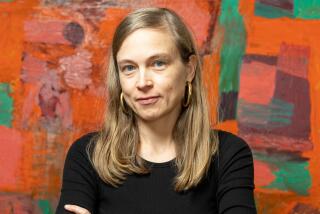For some winners, getting the $150,000 Windham-Campbell Prizes was literally unbelievable
- Share via
Yale University just made nine writers a lot happier and richer — even if they didn’t believe the call at first.
The college announced the winners of the 2016 Windham-Campbell Prizes, a young literary award that named its first recipients in 2013. The awards, presented for fiction, nonfiction and drama, come with a $150,000 payment, making them one of the richest literary prizes in the world.
Familiar names among this year’s winners include critic and biographer Stanley Crouch (“Kansas City Lightning: The Rise and Times of Charlie Parker”) and journalist and essayist Hilton Als (“White Girls”).
But the prizes are especially important for emerging and lesser-known writers, not just because of the large payout, but the publicity it assures them. And some of them could hardly believe it when they were notified of their win.
That includes Canadian playwright Hannah Moscovitch, who initially thought she was being targeted by a swindler. “I thought it was ‘Congratulations, you’ve won a cruise to Florida if you pay $200,’” Moscovitch told the Globe and Mail. “I nearly didn’t listen to the actual voicemail.”
Another winner, Irish playwright Abbie Spallen, had the same experience. “I thought it was a scam at first,” she told the Irish Times.
Australian writer Helen Garner, who received an award for nonfiction, almost missed the notification of her win entirely. The Sydney Morning Herald reports that the email from Yale asking for her phone number landed in her spam folder.
Other winners this year include playwright Branden Jacobs-Jenkins and fiction writers Tessa Hadley and Jerry Pinto, as well as C. E. Morgan, whose new novel “The Sport of Kings” comes out in May.
The Windham-Campbell Prizes are awarded by the Beinecke Rare Book & Manuscript Library at Yale. The prize money comes from the estate of the late author Donald Windham and his life partner, Sandy M. Campbell.
Nine writers are honored each year — three in fiction, three in nonfiction and three in drama. Poetry will be added to the prizes next year.
The awards lend themselves to surprise. There’s no submission process for the anonymously judged prizes, so writers don’t know they’re being considered until they receive a congratulatory phone call from the program’s director, Michael Kelleher.
Kelleher seems to relish his job. On Twitter, he posted, “Best part of my job @WindhamCampbell is calling 9 unsuspecting writers out of the blue [with] news they’ve won $150,000. I feel like [Ed] McMahon.”
Of course, the winners are pretty happy themselves. “I only wish everyone alive could get a phone call like the one I just received,” Jacobs-Jenkins said. “I’ve never ever felt this confident, joyful, relieved or encouraged on a Wednesday morning.”
More to Read
Sign up for our Book Club newsletter
Get the latest news, events and more from the Los Angeles Times Book Club, and help us get L.A. reading and talking.
You may occasionally receive promotional content from the Los Angeles Times.







